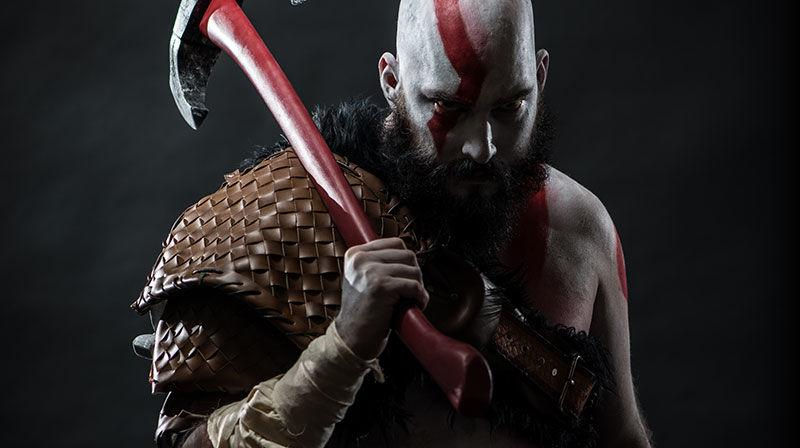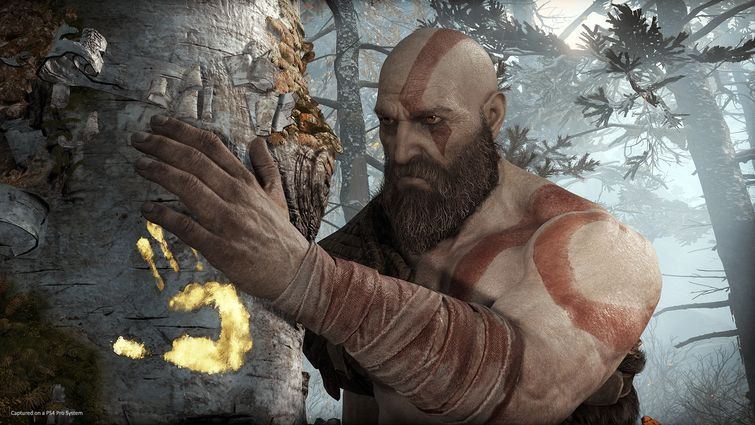God of War
- Mekel Kasanova
- Apr 11, 2018
- 4 min read

The openness of the new God of War goes beyond the design of the earlier games, transitioning from Greek to Norse mythology could have been disastrous, considering Kratos’ deeply personal reasons for destroying the pantheon of Mount Olympus. Thankfully, God of War aims to be much more than a violent tour of Asgard. With his innocent son Atreus, Kratos sets out on his journey in a remarkably well-paced story packed with genuinely surprising moments.

Kratos is a pretty bad father but he tries. Through Atreus’ eyes, we see a new side of God of War. The first act of killing in the game is viewed through a lens of hesitation and regret, as if to ask the player if they are ready for the 30 hours of violence to follow. Contending with the fact that your son is traumatized by killing one animal is tough to stomach while also chasing after a combat upgrade that requires you to cut down over a hundred enemies. It’s an interesting narrative thread to watch the young boy come to grips with the nature of his heritage, rather than attempt to absolve the former of wrongdoing because he cares for his son, God of War gives both Kratos and Atreus plenty of room to grow.

God of War has always showcased absurdly large creatures and intense, fast-paced boss battles, and this entry preserves the ludicrous scale of everything presented. Brilliantly rendered character faces and evocative voice acting drive the emotional narrative, but the game’s overall direction is the real star. The camera blends seamlessly between cutscenes and gameplay, often so well that I didn’t realize when control had been taken away or given back to me. This “single shot” style of presentation lends a dramatic tension that perfectly compliments the nuanced, more mature side of Kratos the game aims to portray. I saw loading screens only upon death. Several scenes track from combat to a conversation and back to exploration without changing the angle or perspective. Put simply, this is one of the most cinematic games I’ve ever played.

As engaging as it is to think critically about why Kratos does so much killing, it’s hard not to enjoy those violent delights.Kratos begins God of War equipped with a weapon called the Leviathan Axe, which looks like any old wooden-handled Viking battle ax, except for its built-in power to freeze anything it touches — a property that comes in handy during puzzles as well as combat. The axe makes for a great change of pace from the standard hacking-and-slashing, as you can throw it to pin enemies and objects and watch it burst through oncoming foes as you call it back to your hands. Switching to Kratos’ bare fists to pummel an unarmed minion while my axe was holding a tougher enemy in place felt empowering, as was the simple manner in which I could command Atreus to launch off a blast of arrows to stun stragglers.

He also has a shield strapped to his left arm, although it only expands to its proper size when he’s actively using it. And his starting armor set includes Worn Wrappings of Exile, “leather forearm wraps” that “conceal a dark secret,” which is one of a few elements in the opening of God of War that suggest that Kratos hasn’t quite been able to leave his bloody past behind. The combination of hand-to-hand fighting, ax, shield and Atreus gives Kratos a lot of combat options from the get-go in God of War. And that’s before you upgrade his skills, weapons or armor — or those of Atreus. Whenever my plan of attack was starting to feel mindless or repetitive, the combat system introduced some new mechanic, i.e, the skill tree and light RPG elements available with customizable armor, but nothing too overwhelming to choose from.I didn’t expect God of War’s ax-based combat to feel as much as it does like, well, God of War.

The reliance on distracting puzzle rooms and played out backtracking. Too often, Kratos and Atreus reach their goal only to be told that they need to retreat, find some new magical object, and return if they want to press on. The fast travel system is needlessly complicated, and while the world isn’t massive, it starts to get grating to be heading between the same destinations multiple times.

The promise of a changed Kratos certainly sets grand expectations for the new God of War. The story manages to provide a thoughtful meditation on its hero’s legacy, the nature of his gratuitous violence, what it means to engage in such senseless killing, and bringing Kratos back to think about the terrible things he’s done, and to ask himself if he can change. While this game offers plenty of callbacks and references to the mythology of the past, this God of War is easily the best entry by making every attempt to make the game a very unique and worthwhile experience.
Disclosure: Copy of the game provided by the publisher.










































Comments